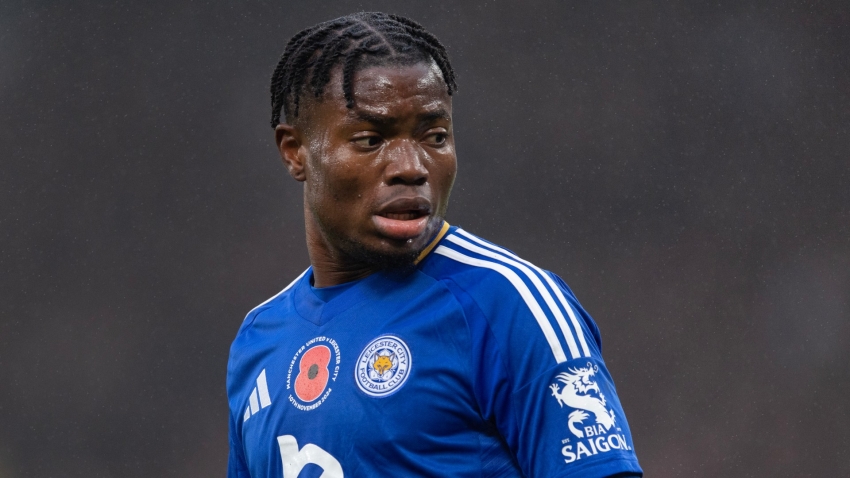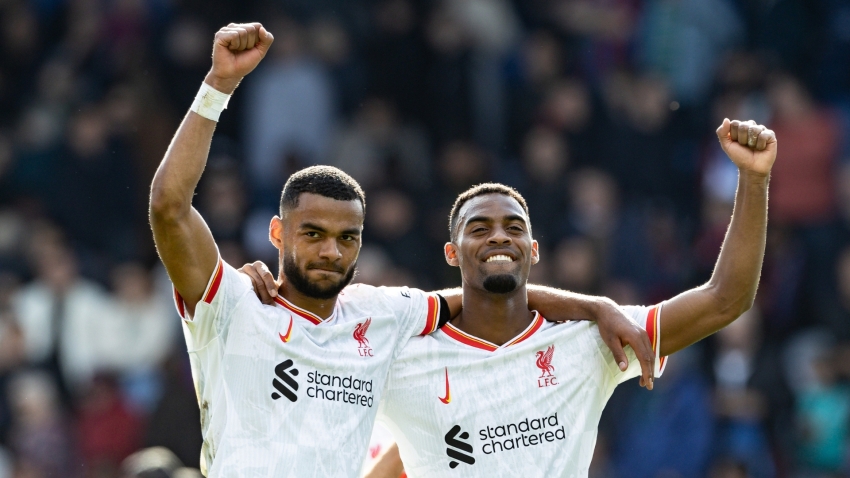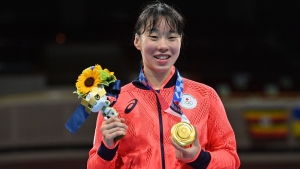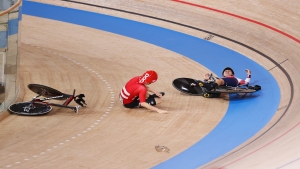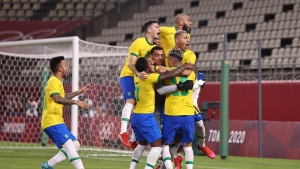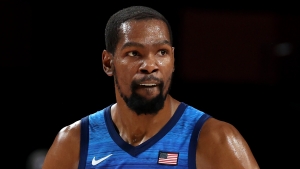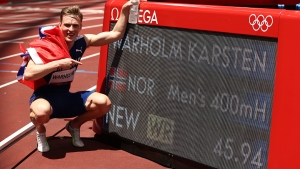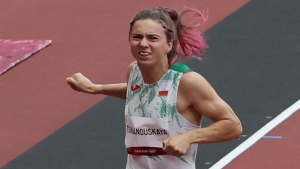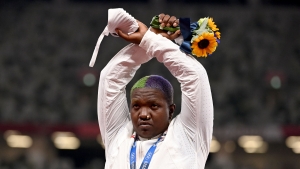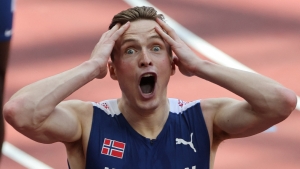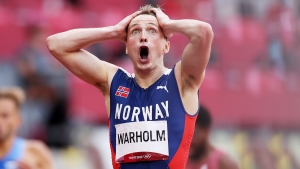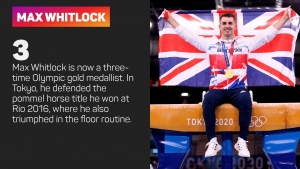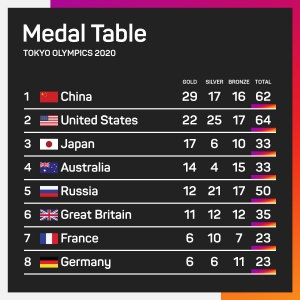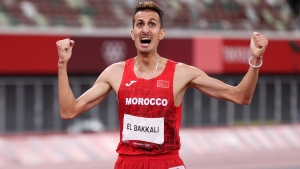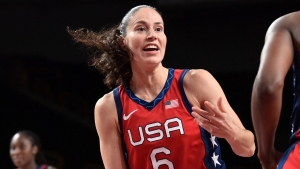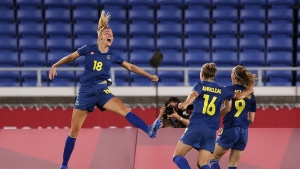Hosting an Olympic Games at any time can be a logistical nightmare. Doing so during the height of a deadly pandemic only exacerbates the difficulties.
For example, how do you go about trying to appease a largely Olympic-sceptic city like Tokyo, whose residents were fearful of the effect welcoming thousands of athletes, officials and world's media would have in increasing coronavirus infection rates.
Stats Perform's man on the ground, Peter Hanson, provides a look at how travel is working at Tokyo 2020 to assuage the fears of the locals, and a behind-the-scenes glimpse of his journeys to the arenas he has visited.
BUSES, BUSES AND MORE BUSES...
Let's start with a secret.
This isn't my first time in Tokyo. I actually visited here seven years ago with a couple of American friends. The three of us had recently been in Bangkok for our buddy's Thai wedding and had decided to make the hop across to continue our travel adventure.
My overriding memories of that first jaunt were just how futuristic it felt, the signs and billboards burning bright LED lights directly into my quickly faltering retinas. For a major city, I remember also thinking how clean the place was. I'm a big fan of city dwelling – but most can be a little untidy in places.
The other thing that sticks out is how absolutely hopeless I was at navigating my way around. This is nothing new, I can barely get around the streets of Sheffield and Rotherham – the places I have lived my entire 31 years – back in England without needing to follow Google Maps. Luckily for me, my travel companions are not quite so directionally challenged, so I largely just hopped on whatever subway they did and didn't ask questions...
So, when I first got asked if I'd like to cover these Games my first reaction was "yes, absolutely". My second was "better start saving up for three weeks' worth of Ubers".
But these are pandemic times, and pandemic times call for pandemic measures. There are rules in place and restrictions to follow, and one of the great logistical challenges Tokyo 2020 organisers have faced is how to ferry around hordes of the world's media while restricting their interactions with locals – many of whom were not keen on hosting the Olympics at all – during the Games.
I have to say, the end result has been pretty impressive. As soon as you enter the departure hall at the airport, you are ferried onto a shuttle bus, taken to a taxi rank being held inside a huge car park around 20 minutes away, popped into a taxi and driven straight to your hotel.
For someone as dense with directions as I am, this was a bit of a relief.
But that was just the first problem to solve. For the first 14 days of your visit to Tokyo, you have to agree not to go anywhere other than your hotel or to Games-specific locations in a previously agreed Activity Plan.
For that fortnight you are also told not to take public transport anywhere. To solve this issue, Tokyo 2020 has created quite the travel network.
The media transport mall at the media centre is connected to nearly all the Games venues. There are over 30 terminals (not quite like you would see in a normal indoor bus depot – rather a series of stops in a huge outdoor space with sort of crudely constructed tents to keep you sheltered should it rain).
Approximately a third of these stops are connected to a list of Tokyo 2020-approved hotels, running buses to our accommodation 24 hours a day (although, understandably, between midnight and 6am these run much less frequently).
The rest ship us off to the Games venues, with drop-off points roughly a five-minute walk to the various media centres.
It is not the only way to get around a city still under a state of emergency. Tokyo 2020 has created the Transport by Chartered Taxi system, whereby you can book Games-specific vehicles to cart you around to the desired location.
After that initial two weeks, you are technically allowed to use public transport (and are provided a travel pass to do so) but actively encouraged to keep using the media network to limit social interactions with the regular public.
MARVELLING AT THE MEDIA CENTRE
One of the things I was most looking to when entering Japan was seeing the media centre.
Okay, sure, partly because I'd been couped up in quarantine for three days and the escape from the four walls of my hotel room was a blessed relief.
But mostly because I was itching to see for the first time what a media centre for an Olympics looks like.
Once taking the bus from the hotel to the media centre, getting in is quite a smooth process. The media complex – which adjoins to the broadcasting centre – is so big that from the transport mall you have to take a shuttle bus. From there, you undergo a temperature check, lower your mask so the security cameras can get a good look at your face, and scan your accreditation card before waiting nervously for the green light to give recognition you are an approved member of the media.
The first impression was just how big the complex is. There are rows upon rows of hot desks, all with plug sockets and LAN cables, while every which way you turn there are TV monitors showing a variety of different events.
There are private offices everywhere (for the likes of the IOC and British Olympics association), medical rooms to drop off PCR tests, help desks for everything from tech woes to transport, food courts, cafes, fancy-looking vending machines…you name it, over several vast floors it's (probably) got it.
TRIBUNE TRAVAILS AT THE AQUATICS CENTRE
The sad thing about the Tokyo Aquatics Centre is the fact it serves as a reminder that these are the Games that could have been.
Opened in February 2020 close to Tokyo Bay, it is a hugely impressive structure that holds approximately 15,000 spectators – sadly, save for the pockets of athletes cheering on their team-mates, these seats are not in use and the bright-blue glow of the pool and the huge screens present an almost eerie feeling without the packed rafters.
My first trip there was an exciting one, though. It would act as my first "live" view of these Games and I got to witness TeamGB's first gold medal of Tokyo 2020 thanks to Adam Peaty, and caught most of Tom Daley's emotional triumph in the men's synchronised 10 metre diving.
It's a process much like the media centre to get in, only here you have a physical thermometer placed on your forehead to check you don't have a temperature. But as at all the venues you do go through airport-style checks before heading down to the media. It was at the aquatics centre I was asked to taste the bottle of water in my bag and, even though I knew it wasn't possible, I did start to panic and wonder what if it had been poisoned…
It hadn't of course and off I popped down the road towards the media area, which for the aquatics centre is a long tent that also adjoins to the press conference room.
So far so good. My issue came again with my aforementioned navigation skills. My friends back home call me 'Captain Direction' I'm that hopeless with them (okay, that's a nickname I actually gave myself but still…). The problem I encountered was trying to find my appropriate area in the media tribune, walking through about 10 different doors, and walking up and down several hefty flights of stairs before I reached the conclusion that I had probably been in the right place from the start…
INSPIRED BY SIMONE AT THE GYMNASTICS CENTRE
Before I travelled to Tokyo, I had a rough idea in my head of some of the things I wanted to do. One at the very top of my priority list was seeing Simone Biles live in the gymnastics.
So, on the first Tuesday of the Games I managed to get a high-demand ticket for the Ariake Gymnastics Centre to watch the final of the women's team event.
The trip there was probably my favourite, because unlike a lot of the other buses that serve just a single venue, this one was bit of a stadium hop around Ariake – a district of Koto in Tokyo.
Before I made it as far as the gymnastics centre, I was treated to a look at the Ariake Tennis Park – where there was a deep temptation to jump off and try and catch a glimpse of Novak Djokovic or Naomi Osaka – and Ariake Arena, where the volleyball was being held.
Eventually, I arrived at the gymnastics centre – an impressive temporary venue, which after the Games will be turned into a 12,000 seater sporting arena, and went through the now customary protocols to get inside.
Unlike my first journey to the aquatics centre, finding my way around here was an absolute breeze. All of the media facilities are inside the building, and there are signs pretty much every few yards directing you to the tribune.
I should at this point make another admission. I don't know the first thing about gymnastics. In fact, when I was at school I was so hopelessly bad at the sport in P.E. or gym or whatever you call it where you are, that my "routine" consisted of a shambolic forward roll and jazz hands. In my defence I was short, stocky, not particularly agile and carrying about 20lbs extra weight. All of those things still stand true today.
But it was too good an opportunity to pass up and it seemed the same for a lot of people in there. I sat next to a journalist from Denmark (whose son by the way is named Peter Hansen – hello Spider-Man meme!) who was there for the exact same reason as me, to see Biles in person.
There was no way to predict what came next, with this genuine living legend managing just one rotation before sitting out the rest of the event. She later revealed she has been contending with mental health issues.
Sitting in the news conference room, it was impossible not be completely full of admiration for this frank admission. Her bravery to send that message, I think, is more important than any achievement she has in gymnastics.
DISCOVERING THE OLYMPICS STADIUM
Another on my bucket list for this trip was obviously to check out the Olympics Stadium. I decided to book in for the athletics at the first opportunity and go to the morning session last Friday.
By that point, I'd been in Tokyo for 10 days and the long days and sleepless nights had taken their toll…so my first journey there I can't recall too much to you because I took a decent snooze on the 30-minute trip.
But, when I got there my initial thought was wow. I absolutely love sports stadia, you can't be a sports-obsessed kid like I was and not. I've seen some impressive arenas in my time – Wembley, Soccer City in Johannesburg, Yankees Stadium…Hillsborough.
And this is right up there among the best I've been to. Only, after that initial buzz I must say I was almost overwhelmed by a sudden sadness.
I think maybe because at the other venues I'd visited I was so one-track minded in what I wanted to do whereas my first visit here was more about finding my bearings and preparing for a busy week to come.
I remember going to one of the morning sessions at London 2012 and the Olympic Stadium was absolutely packed. It was weird seeing this place (with a capacity of 68,000) empty knowing it would stay that way for the rest of the Games, and knowing that really it deserved better.










